My grandfather on my father’s side was a pack-rat welder with a huge garden. He could build anything and grew the best tomatoes I’ve ever tasted. He spray-painted all his tools red. Every single one. We used to make fun of him for that, but now I think it was a brilliant way of making sure he didn’t leave a tool off in the yard somewhere. When he passed away, his children were left to deal with his labyrinth of a garage. It took them weeks.
My father is very organized, but if there’s a tool that he needs for one of his hobbies, he has it. Vertical sausage stuffer? Clearly, a life essential, and I dare you to suggest otherwise.
My grandfather on my mother’s side was a military man. He moved the family so many times while my mom was growing up, she’d attended 18 different schools by the time she graduated high school. As you’d expect, their household was efficient. The kids were trained to clean to “white glove inspection” quality, and taught the mantra “a place for everything, and everything in its place.”
My mother doesn’t keep anything around unless she uses it regularly or enjoys it aesthetically. (Unless it belongs to my father, and even then, accidents have been known to happen.)
Out of this combined genetic heritage: me.
Garage-labyrinth reality, white-glove inspection sensibilities.
• • •
So is your house a big jumble of transition right now? Mine is. Is it driving you nuts yet? I’m there.
Every night the plant starts get hauled in from the patio and take up space on the kitchen counter. Every morning the homeschool books get hauled out and plopped down on the dining room table.
Speaking of the the dining room table, it’s about 18-inches from a feed trough that is holding three rapidly growing ducks. Tiny poultry in your house is adorable until it isn’t. You know what I mean. Let’s be honest, there’s a smell. A smell, eighteen inches from dinner.
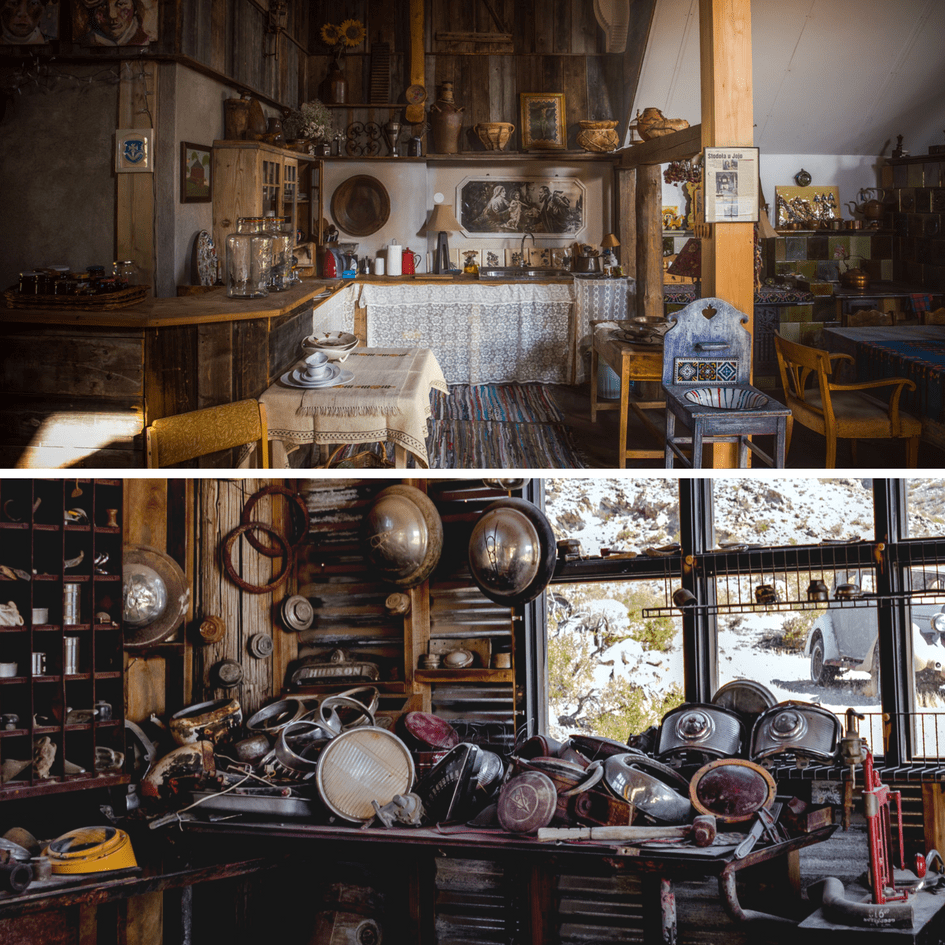
If your stuff ever gets angry, it’s gonna crush you to death with ease.
And can we talk about my garage? The space that does septuple duty as a seed starting space, back-up pantry storage, garage band musical instrument area, home workout gym, camping supply depot, toy and bike arena, and a general purpose workshop?
The one thing that isn’t in my garage is a car. Screw that. Why put a single item that cost $18K in a protected environment, when you can store stacks of free cardboard from Costco and dollar store plastic beach toys in there instead?
I feel like Marie Kondo would very demurely shame me if she walked in right now. Sometimes I remember I wrote a book with a generous section on home care and I just laugh and laugh.
And then I cry a little.
• • •
I was avoiding organizing my garage the other day, and I saw the following comment on a Reddit thread: “The minimalist movement should really just be called outsourcing.”
Minimalism vs productivity is a perennial struggle for me, and apparently I’m not the only one – because when I mentioned this quote last week there was huge feedback.
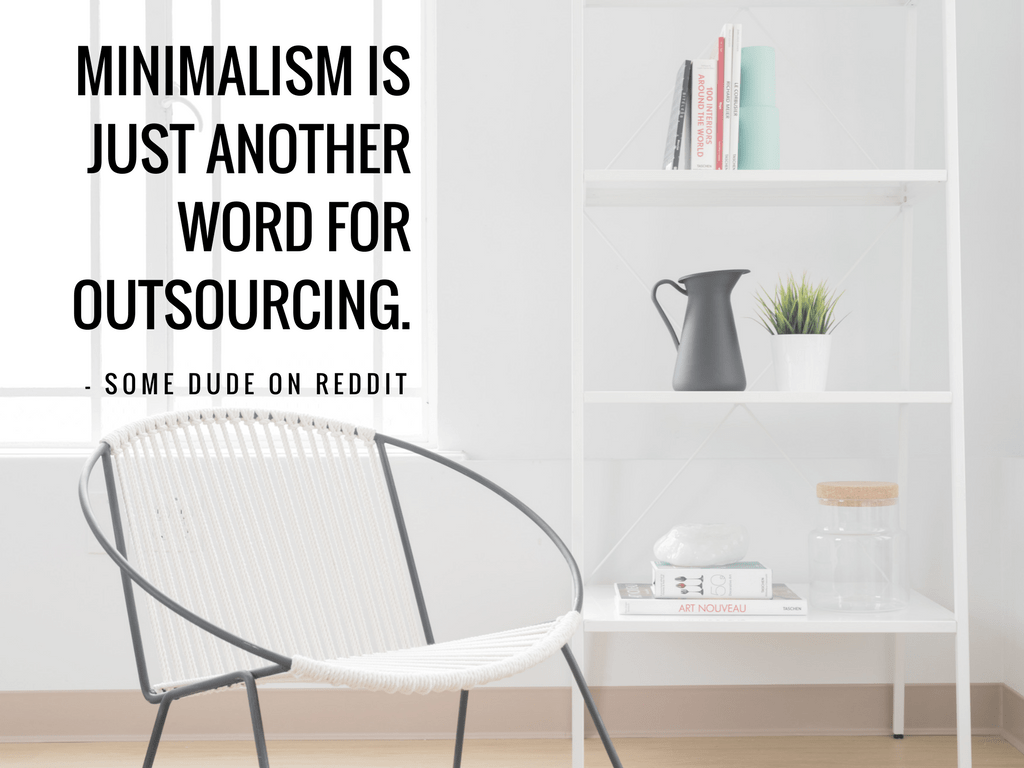
People wrote legitimate full-length blog posts in the comments section. It was great. A few pearls from the community:
I don’t think that minimalism – which does require, I think, a fair bit of outsourcing – is inherently a virtue any more than having a lot of tools and materials on-hand for creative labour like cooking, growing, sewing, mending, building, painting, writing, sculpting, etc., is inherently a vice.
~ Meliad
I may have a few more kitchen items than a “real” minimalist, but I also have a smaller than average home, pared-down closet and avoid clutter and rampant consumerism. I don’t think minimalism is necessarily incompatible with DIY.
~ Christina
Minimalism is a shitty word. Who wants “minimal” to be their goal? I don’t know about you, but I believe that life is short, and I don’t want to get to the end of life and be known for “wow, she really managed to not have a lot of stuff.” Instead of minimalism, my goal is essentialism.
Get rid of what doesn’t matter or what gets in the way of what does matter. Have less, use less in order to have more – and produce something. You grow something, create something and it moves on. Only if it stays does it become clutter.
~ Maria
Chicken stuff, seed-starting stuff, homeschooling stuff, soap-making stuff. Cooking gear, gardening gear, canning gear. Lord, what a lot of stuff, what a lot of gear.
For a bunch of people who typically think lower levels of consumerism are a good thing, we sure do own a bunch of crap. So it’s really nice to know so many of us are together in trying to figure this out.
There has to be a balance point between a calm aesthetic and the messiness inherent in a life that needs stuff to work.
Doesn’t there?
• • •
Thinking of minimalism as outsourcing puts the hot mess of productive homekeeping in more favorable light. We have this gear because we’re trying to in-source more. Yeah, yeah, that’s the ticket. But is that the right way to look at it – just throw minimalism under the bus?
On the one hand, even if there’s a tension between modern homesteading and minimalism, we’re all basically on the same team in terms of supporting greater thoughtfulness in our purchasing decisions.
On the other hand, the two philosophies do tend to lead to very different kitchen countertops. (Seriously, why are minimalist kitchens always white?)
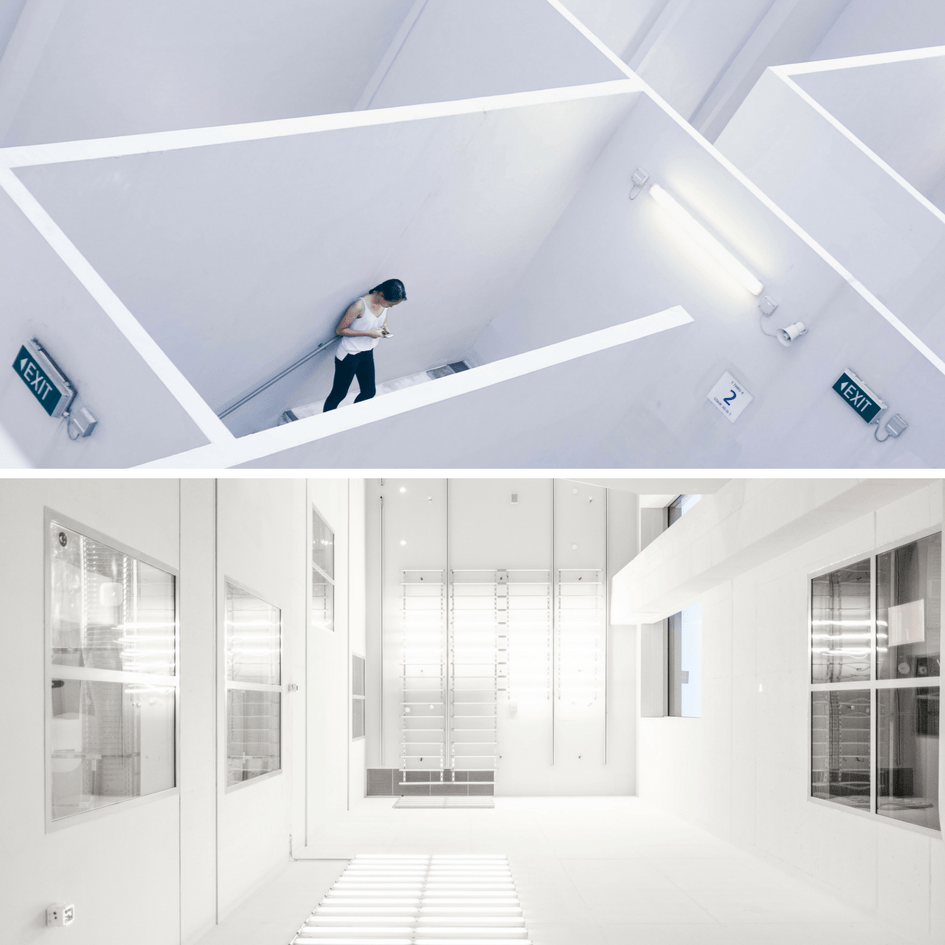
Doesn’t total sensory deprivation for years on end violate the Geneva Conventions?
A productive homekeeper might raise an eyebrow at an urban minimalist who simplifies their life by confining their cooking to toast, while a minimalist could justifiably scoff at how attached we get to our fancy pressure canners and expensive food dehydrators.
And then I’m over here, going, “Uh, sometimes I outsource dinner to the pizza guys because I’m balls deep in canning.”
• • •
I think there’s something each school can learn from the other. Productive homekeepers should ask themselves what’s really necessary. Let’s be honest: it’s easy to fall into the gear trap with any hobby, and if you can justify those hobbies under the cover of “investing in a more sustainable lifestyle” – well, hey, time to buy that electric smoker, amirite?
But the spirit of the movement is to do what you can, with what you have, where you are – not to run to Cabelas or Tractor Supply at the drop of a hat. And the minimalists are right – everything you own owns a tiny piece of you right back. Less really can be more.
Except with mason jars – more is more with mason jars.
On the other hand, some minimalists might question if anti-stuff dogma is actually making them more dependent on a consumerist society. Some of the minimalist travel gurus come to mind here. Sure, you’re free as a bird – as long as every flight, hotel, and restaurant supply chain functions perfectly.
• • •
To me, the ideal of minimalism is to have enough – just what you need for contentment, but no more. From this perspective minimalism is much more about breaking the psychological attachment to things than eschewing good, useful tools in the name of Asceticism.
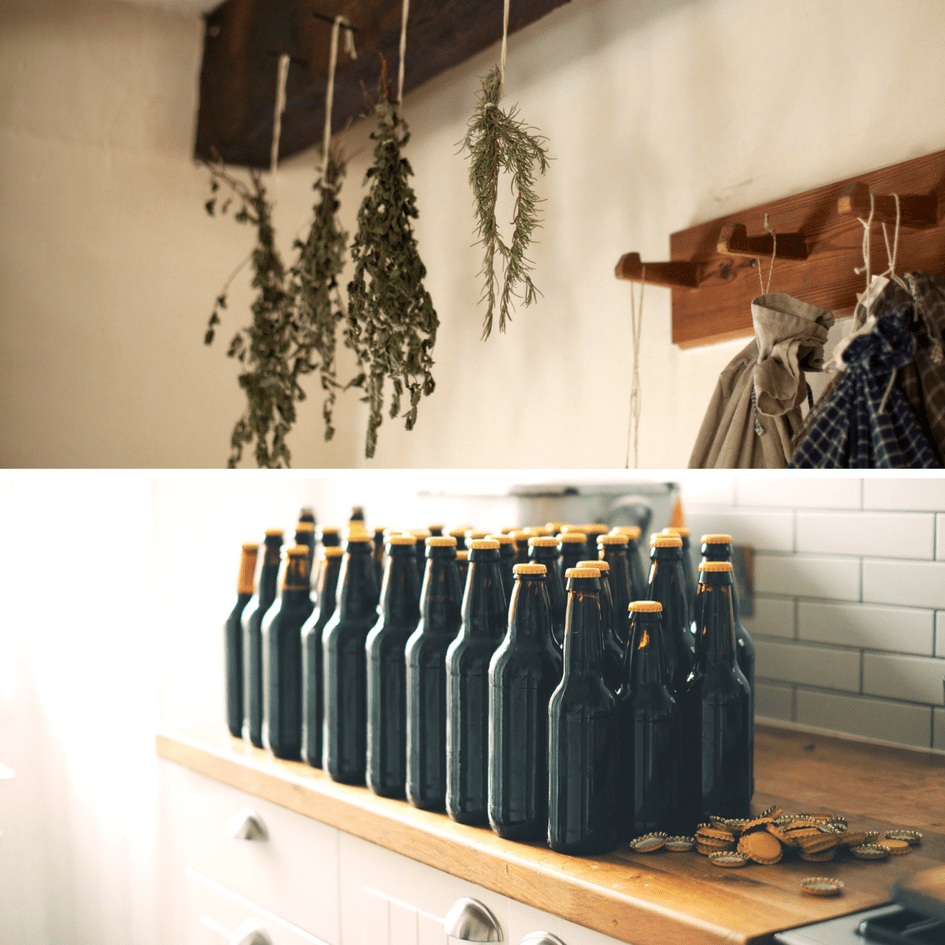
Ahhhh….now that feels just right.
Despite my simple-living fantasies, I will never be a minimalist.
Sure, I long for surfaces, sweetie darling! Surfaces! But given half an opportunity I’ll cover those surfaces with boxes of fruit and canning rings and a huge pot because it’s jam makin’ time.
I love Katherine’s mention of essentialism. (The book of that title is a great read – I’ve listened to it on audio book a half-dozen times. Highly recommend.) It turns the question on it’s head – not how minimal can we get, but what is essential in our lives?
Life. It’s messy. Mine is too messy for the minimalist label.
But essentialism….that I can keep working towards.
• • •
What do you think – are minimalism and a productive homelife incompatible? Is minimalism just another word for outsourcing? Have you found the right balance point for you? Let me know in the comments.
1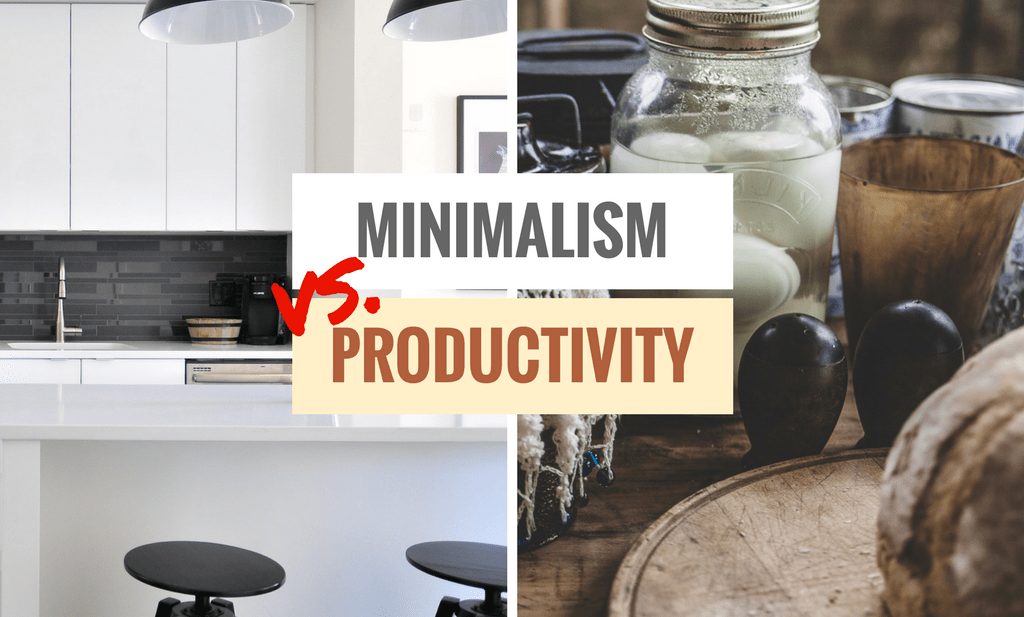
Something that I think is a better resource than most minimalism/essentialism takes is a fantastic book called “The Lean Farm” by Ben Hartman. While it’s focused on for-profit farms, I got a lot out of it even for my small urban homestead, and my wife uses a lot of the techniques (5S/Six Sigma/Lean) in the book in her own industry.
He has a second book coming out this year that covers a little bit more specifics of crops rather than overall farm/business design like the first one. My library system had it but even if yours doesn’t, I think it’s worth purchasing.
He was interviewed on this episode of the Farmer to Farmer podcast: http://www.farmertofarmerpodcast.com/episodes/hartman
I’ve been working with a life/business coach. We’re supposed to be working on my business. What we’re actually working on is tackling this question. Because the lack of order / messiness is something I have trended towards since I was a small child…it is who I am…but I also gets in my way and takes up time in my life that I’m not getting back. So, we’re working on it. In our monthly phone call, just even talking about the state of my garage to another person made me break out in a cold sweat. Jen: “Kyle, could you just have someone build you appropriate shelving in your garage?” Me:”uhhhhhhhhhhhhh….wow, that’s kind of a great idea, Jen, you’re so smart.” So, I’m working on making that happen.
I enjoy having the things I need for a project and I *do * use them, but my system for managing the stuff has to improve.
Kyle, definitely take a look at 5S for improving the functionality of storage. The book I mentioned has a great take on it but there’s a lot of info out there on the ‘net.
I’ve read the Essentialism book and was delighted to have a new framework in which to work. I am a homesteader, so I try to “in source” as much as possible, that means I need the tools to do that. However, I have tried to minimize in areas like clutter and clothes and craft supplies….things that are less essential to being a producer instead of a consumer. (As yes, my garage is full of crap.)
Brilliant. So, so glad you’re back. There are a million blogs and yours is the *only*, literally ONLY, one that is consistently and hauntingly similar to my own phases in life…and thus, the only one I read. Fuck the rest, there isn’t room in my HEAD for other people’s stuff.
Minimalism vs productivity.
I am always evolving toward parting with the un-needed items in my life. Recently reduced my wardrobe to essentials. Like ten shirts and capris. That’s it. And I now breathe when I walk into the closet. It’s better.
Another trick… I never buy a kitchen gadget that a good knife and some skills can’t make obsolete. Sure, I’ve got my juicer, dehydrator, canner etc, but those all enrich the lives of my family.
The thing that is going to bring me the most joy this year: a super large garden shed, with super large overhangs. Get the mowers, tillers and long handle tools out of the barn. Get the irrigation supplies, short handle tools, pots, piles of shade cloth out of my garage. And breathe.
This must be the year for super-large garden sheds. I just had one built, 12′ x 20′, two 4′ doors (one with a ramp), easy access to the garden. On one end is an additional 8′ x 12′ overhang that I customized with a deck floor. It’s taken me 3 weeks and a lot of planning, but I’ve worked out the storage plan. One thing I’ve found is that if I can design my own “system” from scratch, my chances of organizational success are quite high. If I’m stuck with a layout or other features that don’t fit the way my mind works, the clutter is ever present despite all my efforts to keep it cleared. It always comes rushing back in like the tides.
I’d love to see how it turned out 🙂
I’m a grower/preserver etc etc so I’m hearing you but one place I have found minimalism (and it’s enough to give me balance and peace) is in the bathroom and the whole “beauty” regime. I make my own soap without scent and this doubles for body wash, shampoo and face cleanser. I have one other bottle of shampoo and that’s it in the shower. Using that same philosophy, my home made salve and a simple moisturiser covers a range of goods from day creams to night serums and eye moisturiser blah blah. Gradually I’ve got real, pared it back and thrown out the umpteen tubes and pots and don’t get me started on the hair products, that was embarrassing.
I’m a professor organizer, and this is THE million-dollar question. My clients are torn between managing their stuff for maximum efficiency or simply throwing it out. I counsel them to aim for what makes their life the simplest–is it having the right item in the right space for quick retrieval, or is it never looking at your possessions again? In the end, the culprit that determines property is Passion. What is your passion?
Me? I’m a reader, gardener, and prepper who works in organizing, home design, and fashion. I’m sure you can imagine the mismatched items that live together at my house (eg: lbd’s and lbp’s – little black dresses and little black pots ?). I am constantly purging, but have not embraced minimalism. My final result is a tidy home with very neat, but full, drawers & shelves.
If minimalism itself is one’s greatest passion, I say go for it. Empty spaces and few distractions bring peace to many people. Follow the joy! But if you get more joy out of your hobbies than your space, it’s ok to admit it. Follow the joy!
I feel that both extremes on the “stuff” spectrum have a landfill issue. Those who are newly joining the vigorous minimalist movement are sending a huge volume of stuff to landfills. There’s also a correlation (not causation, mind you) with people who regularly upgrade electronics and discard the old ones. On the other extreme end of the spectrum are people who won’t throw anything at all away for fear of waste…effectively moving the landfill right into their home. But the waste is the same.
I try to live what I preach, which is to be a good steward of what I have, and keep inflow to a minimum. Everything that enters my home has to already have a plan for storage and a purpose (not a hopeful use, not a just-in-case plan, but a part to play in a project that is already underway and committed). I keep the same cellphone for as long as it will turn on, and try fixing everything before discarding.
I also preach self-compassion; if I get busy and my stuff gets too big for its britches, I don’t feel shame or blame. I don’t judge my neighbor for having more or less stuff than me; I merely realign myself with my own joy and get back on track. I help my clients with their own journey as well.
Good luck on your own journey! I’m rooting you on, wherever it leads you. Follow the joy!
My hubby and I have been talking about how much gear we have and how great a safety net that gear offers us. We can garden, build cars, can, cider, own toys, etc.
AND, when life gets chancy, we have all this STUFF we could actually sell if we really really had to. (see build cars and toys)
I live in a 1969 RV that’s 27 ft long and 9 ft wide and I get to share that space with my wife and 3 kids, so I totally know what you mean about shifting stuff from one place to another.
>> “To me, the ideal of minimalism is to have enough – just what you need for contentment, but no more”
That’s pretty much it, which is why I eschewed minimalism and totally brought my really, ridiculously heavy, but awesome, pestle and mortar in a space-limited, weight-conscious living space. I mean we may live in an RV, but we’re not animals. You just can’t make good Thai without a good mortar. Though I do tend to only use it indoors so my fellow campers won’t get the idea I’m a weirdo.
I guess I’ve adopted a hybrid approach in the last year or so. We definitely have too much stuff, but we will never be “minimalists” because we’re makers – we grow food, cook-bake-preserve, keep animals, have a child, build stuff, read. So I’m essentializing to that which I actually use in my kitchen and yard, minimizing (with the $20 in 20 minutes replacement rule) for the stuff that’s been kept “just in case,” and Kori Mori’ing everything else.
Aside: as with the kitchens, when you google “minimalist living room” they are almost all white as well. And practically no books, so that right there is a non-starter for me. I always feel confused and anxious in a house without books around.
“the $20 in 20 minutes replacement rule”
I am glad to see someone else who knows the work of those two 😛
I do feel good when there are lots of clean uncluttered surfaces, but then sometimes I go too far and have a big clean out. Invariably the day after I will be looking for something that i just got rid of. Life is a balance.
I am very much caught between both worlds, to the point of feeling trapped at some points. However what I have found is there is a way to almost have both. As a family, we have built a second kitchen/workspace (that we call K2) and all the canning, preserving, curing etc goes on in there (it’s also being expanded with a “cool room” to keep the fermentation and curing at a good temperature). This is allowing us to purge much of our “needless junk” from the rest of the house thus creating a clean, minimalist house, whilst allowing us to still grow, preserve and make the same as we do now
Thank you for making me feel so much better about myself! I have always wanted to be a minimalist /- or maybe more to he point, I want to have everything, but have my house look minimalist.
At my age I’ve already done the downsizing thing. We moved into a retirement home of under 2000 sq ft. That was a definite adjustment letting go of all the “things” I had collected over the years. Yet recently I’ve been looking at Tiny Houses. The problem is the lack of kitchen space in Tiny Houses. I’d need one Tiny House for my kitchen and another Tiny Home to actually live in. Do I need five crockpots? No but I definitely need three and Tiny House living isn’t conducive to a lifestyle of growing, cooking, and storing my own food. Somehow if I can merge these two concepts I could easily live in a Tiny House. I don’t need all the rest of the clutter in my life I just need a dream kitchen and plenty of kitchen storage.
The balance between having too much stuff and not having the stuff you need when you need it is really a reflection of the lack of trust that permeates our society. In the old days, when your barn burned down the neighbors all came around, each with his or her tools and rebuilt it. Now when your barn burns you call your insurance broker and send an order to Amazon for a barn kit (assembly required). It’s a lack of social reliance–a lack of trust in anyone but ourselves.
I hate to lend tools, but I’ll be happy to help you build something. If we share more we don’t need to assemble so much stuff.
Oh, Erica, may I borrow your smoker? I’m making sausage this week?
I’m with you on this. As a beekeeper, chicken keeper, and gardener, I have a lot of stuff, some of which I don’t often use, but when I need it, I’m glad I have it. Throw in my husband’s hobby essentials and the kids’ stuff, and goodness, we’re blessed.
I try to keep things neat and organized, but Marie Kondo would have a field day here too. In all honesty though, I can’t pick up my bee smoker and think it fills me with love (maybe gratitude for not getting stung when I’ve needed it, but not love). I could say that about few things I own actually because they are just that- things.
I do love the feeling I get when I’m in my garden, pulling weeds with my hori hori tool (okay, that’s one thing I come close to loving because it does so many cool jobs), listening to birds flying by and chickens chatting alongside me, watching honey bees buzz in and out of my garden doing their important work too. At those times, I’m filled with happiness and peace. That’s my kind of minimalist. I’m grateful that I have all of this stuff that makes it all possible, and at times, easier.
No doubt, I’ll never be a minimalist either. I rely on too many tools of the trade (and extra canning jars too, just in case). I do need to part with a few more things though, perhaps starting with tools that I’ve replaced with that hori hori tool. Glad to know that I’m not alone in this.
I will never be a minimalist either, but the physical clutter in my life can easily turn into mental clutter. That struggle is real. I’ve heard that public libraries are starting to invest in items to build libraries of “things” for people to check out. They try to buy items that are expensive with long shelf lives so that households can learn how to use them and determine if it is an item essential to their lives before they own it. I’m waiting for the day my town’s library will incorporate something like that. I think communities have a vested interest in sharing big tools and working together to help with the maintenance of those tools. But until then, I’ll just have to continue sorting out my own clutter
Interesting…our Library purchased telescopes and then rented them out to patrons. We had to wait close to a year, there were so many requests. Our Library system is holding all kinds of classes and community oriented events. I love how their role is expanding!
This is a great conversation. I enjoyed the post and all the comments. I think my most difficult letting go is from art or crafts that I really enjoyed many years ago, but have not chosen to pick back up for many years, yet still have all the trappings that went with them. It is like there was never a shut off in my brain to say I am done with that. But obviously I am if I never find time to choose it. Why is that so hard? My current strategy is trying to picture what I would get rid of if we were going to move, even though we are not, and then gifting these previously loved, yet unused items to others who are interested in having and using. One area of my life that I did move toward minimalism is in cooking and eating. I used to enjoy following some cooking shows, studying cookbooks and trying new recipes. I like to cook, and we dont eat out very much. But I just figured out a few really nutritious meals to have every week, and focused on having those ingredients and utensils and that really made more time in my brain and schedule. Now we have just one big meal a day, usually with eggs from our flock, with some simple morning evening snacks to keep us going and we are good. We have a couple favorite restaurants and favorite menu items there that we look forward to once or twice a month. And I enjoy looking for creative inspiration as we work around our place to repurpose what we can, being thankful for what we have. Life is good!